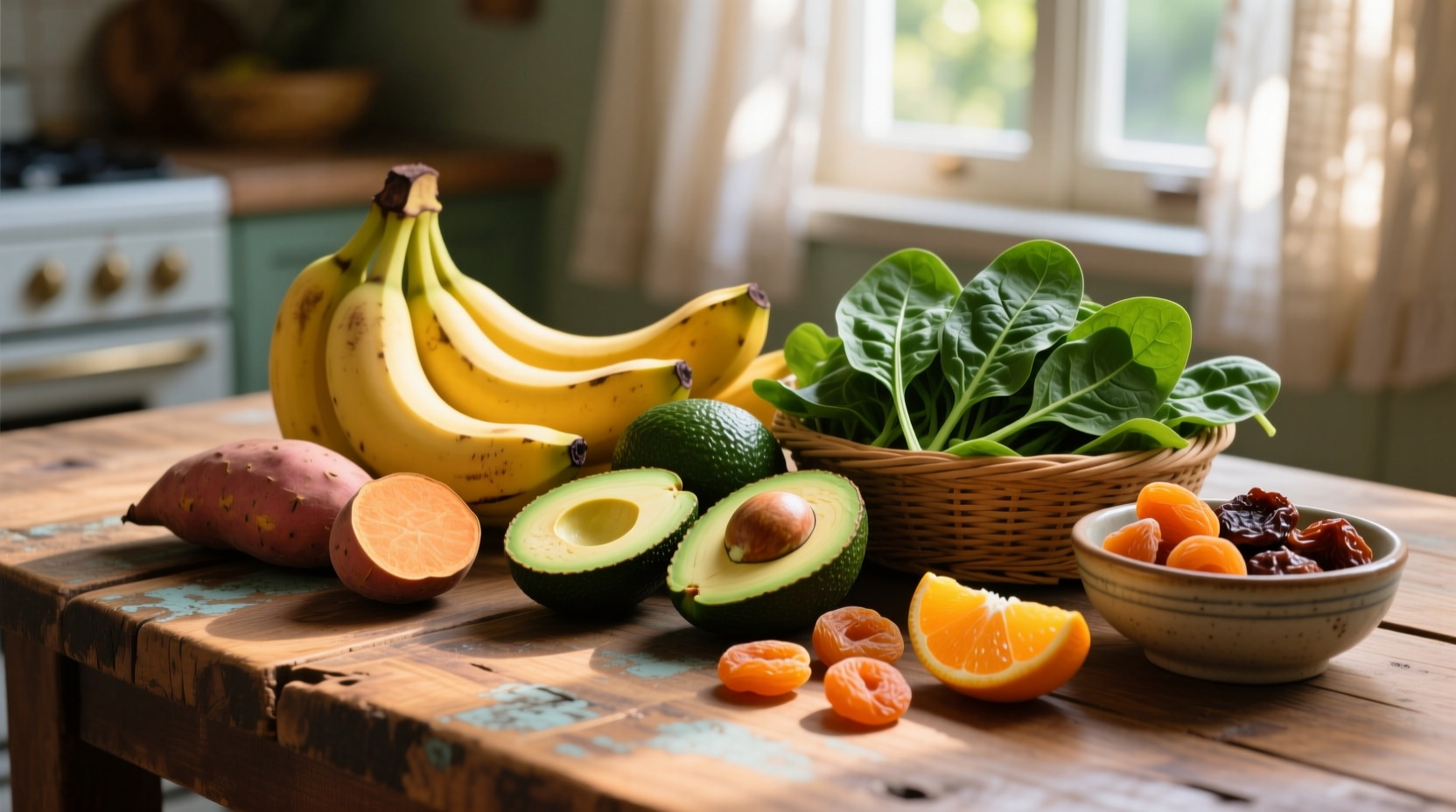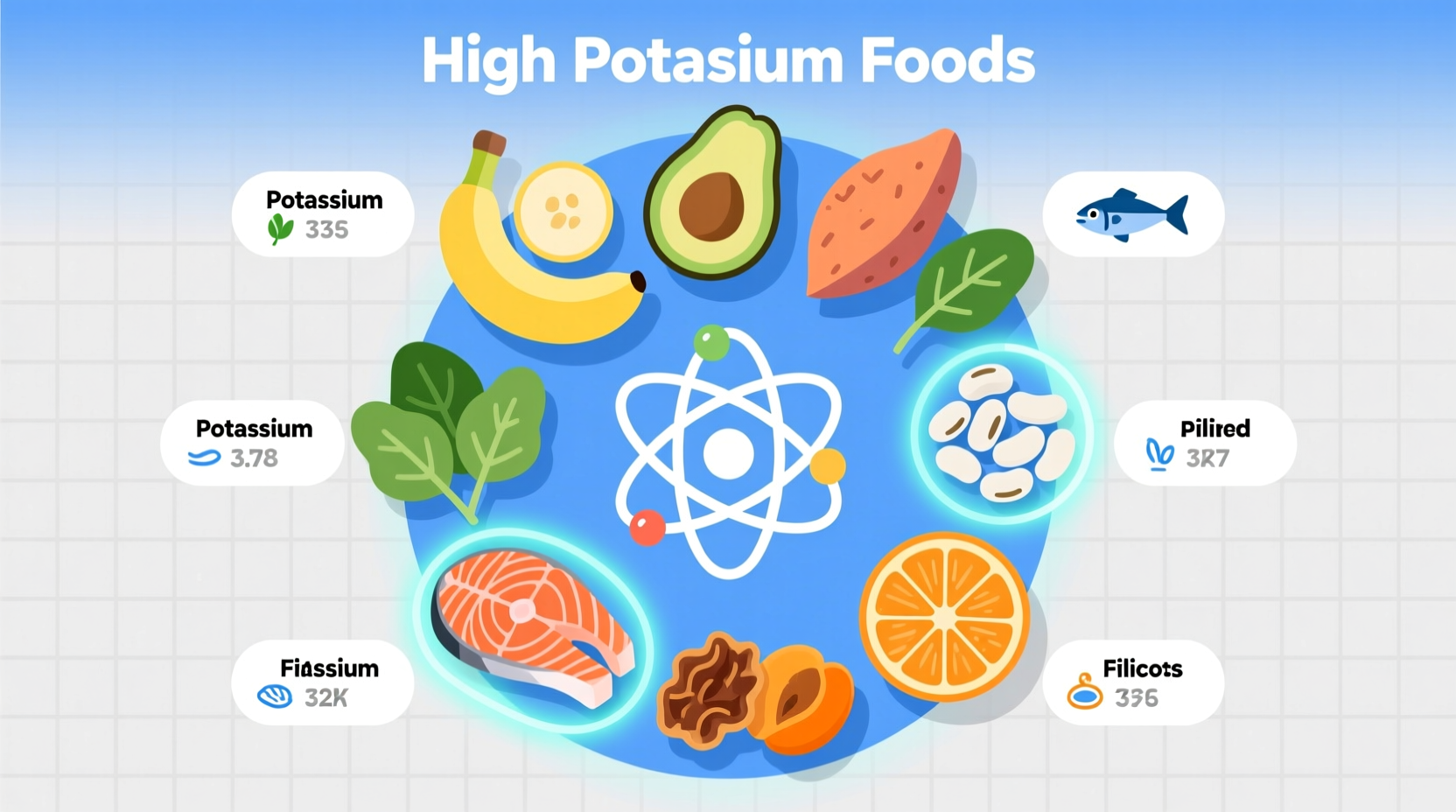Discover the top potassium-rich foods you need: bananas (422mg per medium fruit), sweet potatoes (542mg per medium potato), spinach (839mg per cooked cup), avocados (708mg per whole fruit), white beans (1,189mg per cup), salmon (534mg per 3oz), and mushrooms (305mg per cup). Adults require 2,600-3,400mg daily for optimal heart function, muscle contractions, and fluid balance. This comprehensive guide reveals 30+ food sources with precise measurements and practical ways to incorporate them into your diet.
When you're searching for what foods have potassium in them, you need reliable information that directly addresses your nutritional needs. Potassium isn't just another nutrient—it's essential for maintaining healthy blood pressure, supporting nerve function, and ensuring proper muscle contractions. Whether you're an athlete optimizing performance, managing hypertension, or simply aiming for balanced nutrition, understanding natural potassium sources is crucial.
Why Potassium Matters for Your Health
Potassium works as an electrolyte that helps conduct electrical charges throughout your body. This mineral plays a critical role in several vital functions:
- Regulating fluid balance between cells and bodily fluids
- Maintaining healthy blood pressure by counteracting sodium effects
- Supporting proper nerve signal transmission
- Facilitating muscle contractions including heart function
- Aiding kidney function and waste filtration
According to the National Institutes of Health, inadequate potassium intake affects nearly 98% of Americans. Deficiency symptoms include muscle cramps, fatigue, irregular heartbeat, and digestive issues. Certain populations—like those taking diuretics, endurance athletes, or people with gastrointestinal disorders—require special attention to potassium intake.
Top Potassium-Rich Foods by Category
Understanding natural sources of potassium in diet helps you make informed food choices. Here's a comprehensive breakdown of potassium content across food categories, based on USDA FoodData Central measurements:
| Food | Portion Size | Potassium (mg) | % Daily Value |
|---|---|---|---|
| White beans | 1 cup cooked | 1,189 | 25% |
| Spinach | 1 cup cooked | 839 | 18% |
| Avocado | 1 whole medium | 708 | 15% |
| Sweet potato | 1 medium | 542 | 12% |
| Salmon | 3 oz cooked | 534 | 11% |
| banana | 1 medium | 422 | 9% |
| Mushrooms | 1 cup sliced | 305 | 7% |
| Yogurt | 1 cup plain | 380 | 8% |
Fruits High in Potassium
Beyond the well-known banana, many fruits deliver impressive potassium content. One medium orange provides 237mg, while a single medium kiwi offers 215mg. Dried fruits concentrate potassium—1/4 cup of raisins contains 309mg. Watermelon stands out with 212mg per wedge, making it both hydrating and nutrient-dense.
Vegetables Packed with Potassium
Leafy greens dominate the vegetable category. One cup of cooked Swiss chard delivers 961mg, while cooked beet greens provide 1,309mg per cup. Tomatoes and tomato products are excellent sources too—1 cup of tomato juice contains 527mg. Don't overlook potatoes: both white and sweet varieties offer substantial potassium, with the skin containing significant amounts.
Legumes and Protein Sources
Beans and lentils are potassium powerhouses. Lima beans provide 955mg per cup, while lentils offer 731mg. For animal proteins, fish like halibut (489mg per 3oz) and tuna (450mg) are excellent choices. Even chicken breast contributes 333mg per 3oz serving.

Practical Ways to Increase Potassium Intake
Knowing how much potassium do I need daily is only half the battle—you need actionable strategies to incorporate these foods. Here's how to boost your potassium intake without drastic diet changes:
Simple Swaps for Potassium-Rich Alternatives
- Replace iceberg lettuce with spinach in salads (tripling potassium content)
- Choose baked sweet potato instead of white rice as a side dish
- Snack on an orange instead of an apple for 30% more potassium
- Add white beans to soups and stews for a potassium boost
Sample Daily Meal Plan
Here's how to reach your daily potassium goal through realistic meals:
- Breakfast: Oatmeal topped with banana slices and almonds (700mg)
- Lunch: Spinach salad with avocado, tomatoes, and grilled chicken (1,100mg)
- Snack: Greek yogurt with orange segments (450mg)
- Dinner: Baked salmon with roasted sweet potato and steamed broccoli (1,200mg)
Total: Approximately 3,450mg—meeting daily requirements through whole foods.
Important Considerations for Potassium Consumption
Understanding the context boundaries for high potassium foods ensures you're getting accurate information for your specific situation. Several factors affect how your body processes potassium:
Cooking Methods Matter
Boiling vegetables can leach up to 50% of their potassium into water. To preserve nutrients:
- Steam vegetables instead of boiling
- Use cooking liquid in soups or sauces
- Leave skins on potatoes and sweet potatoes
- Opt for quick stir-frying to minimize nutrient loss
Special Health Considerations
While most people benefit from increased potassium, those with kidney disease must monitor intake carefully. Impaired kidney function can lead to dangerous potassium buildup (hyperkalemia). Always consult your healthcare provider before making significant dietary changes if you have kidney issues or take medications like ACE inhibitors.
Potassium Research Timeline
Understanding the historical context of potassium research helps appreciate current recommendations:
- 1807: Sir Humphry Davy first isolates potassium
- 1920s: Researchers identify potassium's role in nerve function
- 1980s: Studies establish link between potassium intake and blood pressure
- 2005: Institute of Medicine sets first official Adequate Intake levels
- 2019: Updated Dietary Guidelines emphasize potassium-rich food patterns
Debunking Common Potassium Myths
Many misconceptions surround potassium-rich foods. Let's clarify:
- Myth: Bananas are the absolute best source of potassium Fact: While convenient, many vegetables contain more potassium per serving
- Myth: You need supplements to get enough potassium Fact: Most people can meet needs through food alone
- Myth: All processed foods are low in potassium Fact: Some processed foods like tomato sauce retain significant potassium
Your Potassium Questions Answered
These frequently asked questions address common concerns about foods containing potassium for athletes and general health:











 浙公网安备
33010002000092号
浙公网安备
33010002000092号 浙B2-20120091-4
浙B2-20120091-4